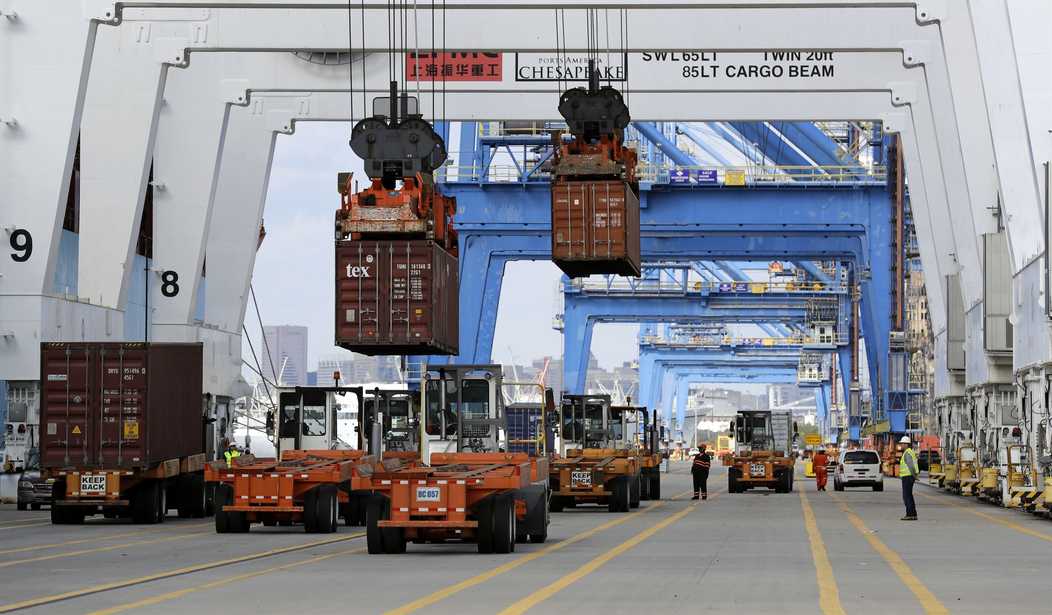As Americans' awareness of threats from China increases — thanks to a spy balloon in our skies and a growing understanding of TikTok's influence — the U.S. officials are ringing the alarm about another potential avenue for malign interference in the United States from Beijing: cranes.
The highly visible but generally ignored ship-to-shore cranes at American ports are responsible for loading and unloading tens of millions of shipping containers each year. In addition to being a critical component of American supply chains, they're also used in some cases by the U.S. military.
Some of these cranes are innocuous, but an estimated 80 percent of ship-to-shore cranes operating at U.S. ports are made by ZPMC, a China-based manufacturer, leading to rising concern among American defense and national security personnel that have compared the cranes to a "Trojan horse," according to an exclusive report in The Wall Street Journal.
WSJ reports that the ZPMC cranes made by the Chinese company are "comparably well-made and inexpensive" compared to other cranes produced by other manufacturers, but "they contain sophisticated sensors that can register and track the provenance and destination of containers, prompting concerns that China could capture information about materiel being shipped in or out of the country to support U.S. military operations around the world."
ZPMC, according to WSJ, "is a subsidiary of China Communications Construction Co., a leading contractor for Chinese leader Xi Jinping’s Belt and Road initiative to develop infrastructure and trade links across Asia, Africa and beyond." In 2020, five units of the China Communications Construction Company saw their access to American technology "limited," due to the company's "role in Beijing’s military-civil fusion program, among other factors."
Recommended
The WSJ report quoted the former cybersecurity lead at the port of Houston who warned "[i]t wouldn't be hard for an attacker to disable one sensor on a crane and prevent the crane from moving" because the "systems aren't designed for security, they are designed for operations."
Among other worries enumerated in the report, some fear that the ZPMC cranes could, in addition to being shut down by an outside attacker or tracking what is moving in and out of U.S. ports, be turned into sabotage devices to cripple American ports without a foe needing to float its navy into U.S. waters.
More via WSJ:
The huge cranes are generally delivered to U.S. ports fully assembled on ships and are operated through Chinese-made software. In some cases, U.S. officials said, they are supported by Chinese nationals working on two-year U.S. visas, factors they described as potential avenues through which intelligence could be collected.
The Defense Intelligence Agency conducted a classified assessment in 2021 and found that Beijing could potentially throttle port traffic or gather intelligence on military equipment being shipped. U.S. officials didn’t say whether they had found any specific instances of ZPMC cranes being used for espionage.
“DIA’s analytic efforts assist the U.S. military in anticipating and mitigating threats to global mobility, which relies in part on commercial transportation and shipping,” DIA spokesman Lt. Col. Dean Carter said.
In the past two years, ports in Virginia, South Carolina and Maryland that are at times used by nearby U.S. military bases acquired new cranes from ZPMC, prompting concern within the U.S. national-security community and the Federal Bureau of Investigation, according to people familiar with the concerns.
In 2021, FBI agents searched a cargo ship delivering ZPMC cranes to the Baltimore port and found intelligence-gathering equipment on board, some of the people said. The Wall Street Journal couldn’t determine what action, if any, was taken as a result.
That all sounds...not ideal. If left up to President Biden, it seems unlikely any concrete action will take place, given his failure to address the CCP spy balloon that he allowed to drift over the continental United States. With 80 percent of the United States' operational ship-to-shore cranes being from ZPMC, there's also likely no quick fix to the issue.
It may be up to House Republicans to conduct some oversight — perhaps former Marine counterintelligence officer Rep. Mike Gallagher (R-WI) and his Select Committee on the Strategic Competition Between the United States and the Chinese Communist Party — in order to spur action from the White House to tackle yet another threat from the CCP that is now raising concerns.

























Join the conversation as a VIP Member